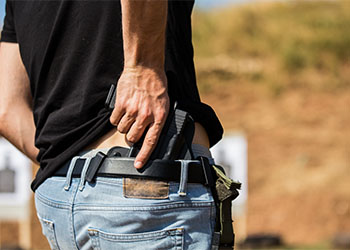What Constitutes Possession of a Firearm Under Federal Law?
Oct. 10, 2025
 Many people are surprised to learn that under federal law, “possession” of a firearm can occur even without physically holding or using a gun. Simply being near a firearm—or having access to one—can be enough to trigger criminal liability in federal court.
Many people are surprised to learn that under federal law, “possession” of a firearm can occur even without physically holding or using a gun. Simply being near a firearm—or having access to one—can be enough to trigger criminal liability in federal court.
Whether you’re accused of being a felon in possession of a firearm, found in a car with a firearm, or living in a home where a gun is stored, you could find yourself facing years in prison.
For individuals in Oklahoma City, Tulsa, Okmulgee, Muskogee, Norman, Chickasha, Shawnee, or Edmond, Attorney Marna Franklin , defends clients against firearm possession charges in federal court.
These cases are often built on assumptions, circumstantial evidence, or broad interpretations of what "possession" means. Having legal representation that understands how federal prosecutors approach these cases is critical.
If you’re facing federal gun charges, contact Franklin Law Firm, PC right away to protect your rights.
Federal Definition of Firearm Possession
Under federal law, possession of a firearm isn’t limited to physically holding a gun. Courts recognize two primary types of possession: actual and constructive. Both can lead to serious charges, including for individuals who never touched the firearm at all.
Actual possession means having physical control of the firearm—such as holding it, carrying it, or having it tucked in your waistband or bag.
Constructive possession occurs when someone has knowledge of a firearm and the ability to control it, even if it’s not physically on them. This could mean a gun hidden in your car, bedroom, or locker—if the government can prove you knew it was there and had access to it.
The government doesn't need to prove ownership—only possession. Even temporary control or shared access with others can be enough to support a federal charge.
What Prosecutors Must Prove
To secure a conviction for firearm possession under federal law, prosecutors must establish several key elements beyond a reasonable doubt.
In most cases, they must prove:
That the object in question was a “firearm” under federal law
That the defendant knowingly possessed the firearm
That the firearm traveled in or affected interstate commerce
That the defendant was prohibited from possessing a firearm (if charged under 18 U.S.C. § 922(g))
“Knowingly” is a critical element. This means that someone can't be convicted simply for being near a firearm unless prosecutors can show they were aware of the gun and had the ability to exercise control over it.
The “interstate commerce” requirement is typically easy for the government to meet—most guns have crossed state lines at some point in manufacturing, so federal jurisdiction is usually established.
Types of Federal Firearm Possession Charges
There are several ways that possession of a firearm may be charged in federal court, depending on the specific facts of the case and the individual’s status.
Common federal possession-related charges include:
18 U.S.C. § 922(g): Prohibits certain people from possessing firearms (e.g., felons, drug users, domestic violence offenders).
18 U.S.C. § 922(j): Possession of a stolen firearm.
18 U.S.C. § 922(k): Possession of a firearm with an altered or obliterated serial number.
18 U.S.C. § 922(o): Unlawful Possession of a Machinegun (including machinegun conversion devices).
18 U.S.C. § 924(c): Possession of a firearm during and in relation to a drug trafficking or violent crime.
Each of these charges carries serious penalties, and multiple charges can be filed in the same case if more than one condition is met.
Who Is Prohibited From Possessing a Firearm?
Not everyone is allowed to possess a firearm under federal law. If you fall into a prohibited category, simply having access to a gun—even without using it—can result in criminal charges.
Categories of people prohibited from firearm possession under 18 U.S.C. § 922(g):
Convicted felons
Fugitives from justice
Unlawful users of controlled substances (including medical marijuana cardholders)
People convicted of misdemeanor domestic violence
Individuals subject to certain protection orders
Undocumented immigrants or non-immigrant visa holders
People dishonorably discharged from the military
Individuals adjudicated as mentally ill or committed to mental institutions
Even if your felony conviction is years old or occurred at the state level, it can still serve as the basis for a federal charge if you're found in possession of a firearm.
Constructive Possession
One of the most controversial and widely misunderstood aspects of federal firearm law is constructive possession. This is where someone is charged with possession even though they never physically held or used the firearm.
Examples where constructive possession may be alleged:
A firearm was found in a shared vehicle's glove compartment
A gun located under a bed or couch in a jointly occupied home
A weapon inside a backpack in the trunk of a friend’s car
A firearm was found during a search of a residence where multiple people live
In these situations, the government must show more than just proximity—they must prove the person knew about the firearm and had control or dominion over it. In many cases, this involves circumstantial evidence such as fingerprints, text messages, or inconsistent statements.
Constructive possession cases are often contested and fact-specific, making legal representation essential.
Sentencing and Penalties for Federal Firearm Possession
Federal firearm charges can carry long prison sentences, especially if the defendant has a prior record or the firearm was used in connection with another offense.
Typical penalties for possession charges include:
Up to 15 years in federal prison for unlawful possession under 18 U.S.C. § 922(g)
Mandatory minimums under 18 U.S.C. § 924(c): Five years or more for possession during a drug trafficking or violent offense, with enhancements for multiple offenses
Fines up to $250,000 and supervised release terms
If the person has three or more prior violent felony or serious drug convictions, they may be subject to the Armed Career Criminal Act (ACCA), which carries a mandatory minimum of 15 years in federal prison.
Sentencing is heavily influenced by the U.S. Sentencing Guidelines and depends on factors such as criminal history, the presence of other offenses, and whether the defendant accepted responsibility.
Legal Defenses to Firearm Possession Charges
Every firearm possession case is different, and multiple defense strategies may be available depending on the evidence, the location of the firearm, and the defendant's legal status.
Common legal defenses include:
Lack of knowledge: The defendant didn’t know the firearm was present.
No control or access: The defendant had no dominion over the place where the firearm was found.
Unlawful search or seizure: The gun was discovered during an illegal police search in violation of the Fourth Amendment.
Mistaken identity: The government can't prove the defendant had any connection to the firearm.
False accusation or planted evidence: In some cases, false reports or frame-ups may be part of the defense.
Each case must be carefully reviewed to determine the strength of the prosecution's claims and the most effective defense strategy.
Reach Out to an Experienced Federal Firearm Charges Attorney
Being charged with possession of a firearm under federal law doesn’t automatically mean conviction. But it does mean you need to act quickly, especially when the case involves constructive possession or prior convictions.
Franklin Law Firm, PC, located in Oklahoma City and serving Norman, Chickasha, Shawnee, Edmond, Tulsa, and Muskogee represents individuals facing federal firearm charges.
With extensive experience defending clients in U.S. District Courts, Attorney Marna Franklin works to protect your rights and build a strong defense based on the facts of your case. Don't wait until it's too late. If you’re being investigated or have already been charged, help is available.
Contact Franklin Law Firm, PC today to schedule a consultation and take the first step toward protecting your future.
